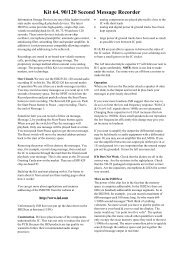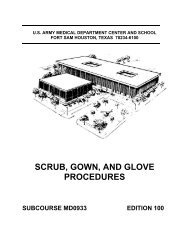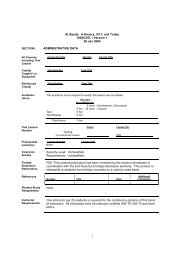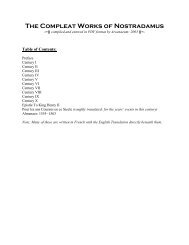Download This File - The Free Information Society
Download This File - The Free Information Society
Download This File - The Free Information Society
You also want an ePaper? Increase the reach of your titles
YUMPU automatically turns print PDFs into web optimized ePapers that Google loves.
Training<br />
Upon taking office in 1994, DEA Administrator Constantine<br />
requested a review of DEA’s training curriculum to ensure that<br />
state-of-the-art procedures and techniques were being provided<br />
in all DEA training. <strong>The</strong> goal was to have every DEA<br />
employee fully trained and prepared to operate successfully<br />
in the ever-changing environment of drug law enforcement.<br />
As a result of the re-evaluation of training procedures, a<br />
number of significant changes were instituted:<br />
• Training programs for basic agents, diversion<br />
investigators, intelligence analysts, and chemists were<br />
required to devote more time to legal issues, integrity,<br />
and personal responsibility.<br />
• Basic agent training was extended to 16 weeks. Also, in<br />
order to support the increased emphasis on personal<br />
responsibility, the DEA structured 25 hours of formal<br />
ethics and integrity sessions into the basic agent<br />
training program. <strong>The</strong>se “life training” sessions<br />
emphasized the positive aspects of integrity<br />
and police ethics and equipped new agents<br />
with the moral tools needed to successfully<br />
tackle ethical dilemmas.<br />
31<br />
• <strong>The</strong> Field Training Agent Program was instituted to<br />
provide continuous training and direction to<br />
probationary agents after completing basic agent<br />
training.<br />
• An in-service training course, to be held every 18<br />
months, was developed for all core series employees.<br />
<strong>The</strong> program stressed reviews of internal regulations,<br />
oral and written communication skills, legal issues,<br />
case law, operational and tactical procedures,<br />
integrity, and personnel issues, such as sexual<br />
harassment. <strong>The</strong> course also included an ethics<br />
curriculum similar to that used for basic agent<br />
training.<br />
• A Training Advisory Committee, which met twice a<br />
year, was established to assess the training<br />
curriculum and increase field input into specific<br />
training programs.<br />
From 1995 to September 1998, the DEA trained 1,586 basic<br />
agents, and from 1994 to September 1998, over 110,000 state<br />
and local law enforcement officers.

















